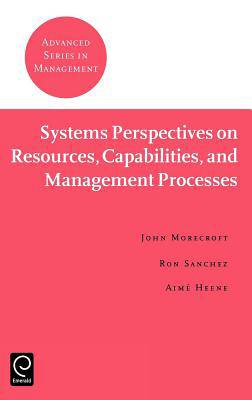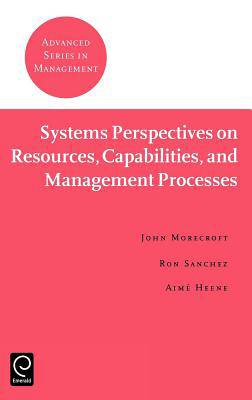
- Afhalen na 1 uur in een winkel met voorraad
- Gratis thuislevering in België vanaf € 30
- Ruim aanbod met 7 miljoen producten
- Afhalen na 1 uur in een winkel met voorraad
- Gratis thuislevering in België vanaf € 30
- Ruim aanbod met 7 miljoen producten
Zoeken
Systems Perspectives on Resources, Capabilities, and Management Processes
€ 248,45
+ 496 punten
Omschrijving
Traditional notions of stand-alone, "atomistic" organizations are giving way to new concepts about organizations and new modes of organizational interaction. Systems thinking is now becoming an essential skill for managers and management researchers who want to understand new kinds of competitive and cooperative interrelationships between organizations. This volume brings together systems and strategy thinkers to develop a number of systems perspectives and approaches that are essential in managing today's organizations. A main feature of this volume is its careful integration of systems concepts with contemporary strategic management ideas about organizational resources, capabilities, and management processes. The work explains essential systems concepts and their central role in current ideas about organizational competence. Papers in the volume apply systems concepts to: modelling practical management problems; reconceptualizing the nature of organizations and their internal processes; improving managerial sensemaking capabilities in complex environments; devising "simple rules" for reducing and managing organizational complexity. Several case studies and examples are used to illustrate key systems concepts and their application to management practice. The book also provides a solid grounding in essential systems concepts for management researchers developing new management theory for today's complex environments, as well as practical insights for managers who must manage increasing complexity in their organizations today.
Specificaties
Betrokkenen
- Uitgeverij:
Inhoud
- Aantal bladzijden:
- 246
- Taal:
- Engels
- Reeks:
- Reeksnummer:
- nr. 2
Eigenschappen
- Productcode (EAN):
- 9780080437781
- Verschijningsdatum:
- 26/02/2002
- Uitvoering:
- Hardcover
- Formaat:
- Genaaid
- Afmetingen:
- 165 mm x 240 mm
- Gewicht:
- 571 g

Alleen bij Standaard Boekhandel
+ 496 punten op je klantenkaart van Standaard Boekhandel
Beoordelingen
We publiceren alleen reviews die voldoen aan de voorwaarden voor reviews. Bekijk onze voorwaarden voor reviews.











